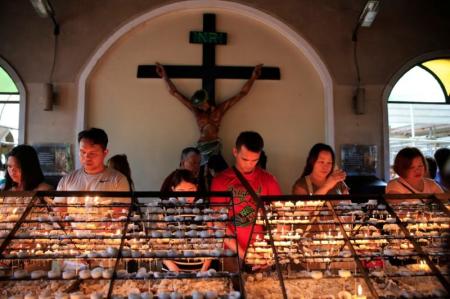Top Philippines court refuses to legalize same-sex marriage in unanimous decision

In a unanimous decision, the Supreme Court of the Philippines has dismissed a landmark petition to legalize same-sex marriage in the majority Catholic country.
On Tuesday, the country’s highest court ruled that Jesus Nicardo Falcis III, an openly gay attorney who initiated the petition in 2015, had no legal standing in the case since he had not applied for a marriage license, the South China Morning Post reported.
Despite its decision, in a text released to journalists, the court noted the Southeast Asian nation's 1987 Constitution “does not define, or restrict, marriage on the basis of … sexual orientation, or gender identity” and said that same-sex unions “may, for now, be a matter that should be addressed to Congress.”
Falcis, who added a gay and a lesbian couple to his petition in 2016, sought to declare Articles 1 and 2 of the Family Code unconstitutional. These provisions limit marriage to a union between a man and a woman.
The high court also held Falcis and his co-counsels Darwin Angeles, Keisha Trina Guangko and Christopher Maranan liable for indirect contempt, the Philippine news site philstar.com reported.
The court explained that "[t]o forget [the bare rudiments of court procedure and decorum] – or worse, to purport to know them, but really, only to exploit them by way of propaganda – and then, to jump headlong into the taxing endeavor of constitutional litigation is a contemptuous betrayal of the high standards of the legal profession."
Declaring the decision “disheartening,” Falcis, along with other gay rights activists, have vowed to continue fighting for same-sex marriage in the country where 80% of its 107 million people are Roman Catholic, according to philstar.com. Abortion and divorce are both illegal in the country, due in part to resistance from the Catholic Church.
A 2015 Pew Research Center report found that Filipinos have conservative views on social issues, reflective of the country's Catholic influence. Two-thirds (67%) say that getting a divorce is morally unacceptable and overwhelmingly view having an abortion as immoral (93%). However, an earlier Pew report found that more than 70% of Filipinos say that homosexuality should be accepted.
Although flip-flopping on the issue, Philippine President Rodrigo Duterte said as recently as July 2018 that he favors civil unions over same-sex marriage.
In March 2017, he told journalists that same-sex marriage and other issues around sexuality and gender were part of Western culture, not Filipino culture.
"That’s for them. That can’t apply to us, because we are Catholics," he said, according to The Washington Post. "[T]here is the civil code, which states you can only marry a woman for me, and for a woman to marry a man. That’s the law in the Philippines.”
Still, Duterte said the rights of the LGBT community would be protected during his presidency.
"There will be no oppression and we will recognize your importance in society," Duterte said at an LGBT conference in Davao City, Philippines, local outlets reported.
In 2016, professional boxer and Filipino congressman Manny Pacquiao made headlines after calling those in same-sex relationships “worse than animals.”
The former eight-division world champion later defended his stance as based on his beliefs on the Bible: "What I am condemning is the act. I'm happier because I'm telling the truth. … It's worse if we will hide the truth," the boxer clarified.
At the time, Pacquiao was publicly backed by the Catholic Church in the Philippines, with Father Jerome Secillano, executive secretary of the Catholic bishops' public affairs office, stating: "This is really in the Bible. There is this quote he (Pacquiao) uses from the Bible and we cannot change that."
"The church ... says that if this is your lifestyle, if this is your orientation, then we respect that, we cannot condemn them," the priest said.





















